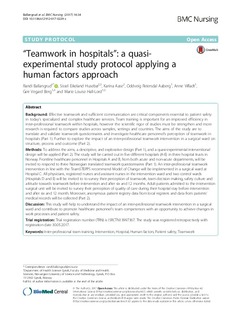| dc.contributor.author | Ballangrud, Randi | |
| dc.contributor.author | Husebø, Sissel Iren Eikeland | |
| dc.contributor.author | Aase, Karina | |
| dc.contributor.author | Aaberg, Oddveig Reiersdal | |
| dc.contributor.author | Vifladt, Anne | |
| dc.contributor.author | Berg, Geir Vegard | |
| dc.contributor.author | Hall-Lord, Marie Louise | |
| dc.date.accessioned | 2017-10-25T14:15:44Z | |
| dc.date.available | 2017-10-25T14:15:44Z | |
| dc.date.created | 2017-06-30T08:20:13Z | |
| dc.date.issued | 2017 | |
| dc.identifier.issn | 1472-6955 | |
| dc.identifier.uri | http://hdl.handle.net/11250/2462200 | |
| dc.description.abstract | Background: Effective teamwork and sufficient communication are critical components essential to patient safety in today’s specialized and complex healthcare services. Team training is important for an improved efficiency in inter-professional teamwork within hospitals, however the scientific rigor of studies must be strengthen and more research is required to compare studies across samples, settings and countries. The aims of the study are to translate and validate teamwork questionnaires and investigate healthcare personnel’s perception of teamwork in hospitals (Part 1). Further to explore the impact of an inter-professional teamwork intervention in a surgical ward on structure, process and outcome (Part 2).
Methods: To address the aims, a descriptive, and explorative design (Part 1), and a quasi-experimental interventional design will be applied (Part 2). The study will be carried out in five different hospitals (A-E) in three hospital trusts in Norway. Frontline healthcare personnel in Hospitals A and B, from both acute and non-acute departments, will be invited to respond to three Norwegian translated teamwork questionnaires (Part 1). An inter-professional teamwork intervention in line with the TeamSTEPPS recommend Model of Change will be implemented in a surgical ward at Hospital C. All physicians, registered nurses and assistant nurses in the intervention ward and two control wards (Hospitals D and E) will be invited to to survey their perception of teamwork, team decision making, safety culture and attitude towards teamwork before intervention and after six and 12 months. Adult patients admitted to the intervention surgical unit will be invited to survey their perception of quality of care during their hospital stay before intervention and after six and 12 month. Moreover, anonymous patient registry data from local registers and data from patients’ medical records will be collected (Part 2).
Discussion: This study will help to understand the impact of an inter-professional teamwork intervention in a surgical ward and contribute to promote healthcare personnel’s team competences with an opportunity to achieve changes in work processes and patient safety. | nb_NO |
| dc.language.iso | eng | nb_NO |
| dc.publisher | BioMed Central | nb_NO |
| dc.rights | Navngivelse 4.0 Internasjonal | * |
| dc.rights.uri | http://creativecommons.org/licenses/by/4.0/deed.no | * |
| dc.title | “Teamwork in hospitals”: a quasiexperimental study protocol applying a human factors approach | nb_NO |
| dc.type | Journal article | nb_NO |
| dc.type | Peer reviewed | nb_NO |
| dc.description.version | publishedVersion | nb_NO |
| dc.source.journal | BMC Nursing | nb_NO |
| dc.identifier.doi | 10.1186/s12912-017-0229-z | |
| dc.identifier.cristin | 1480022 | |
| dc.description.localcode | © The Author(s). 2017 Open Access This article is distributed under the terms of the Creative Commons Attribution 4.0 International License (http://creativecommons.org/licenses/by/4.0/) | nb_NO |
| cristin.unitcode | 194,18,23,20 | |
| cristin.unitcode | 194,18,23,30 | |
| cristin.unitname | Seksjon for sykepleie | |
| cristin.unitname | Seksjon for helse, teknologi og samfunn | |
| cristin.ispublished | true | |
| cristin.fulltext | original | |
| cristin.qualitycode | 1 | |

